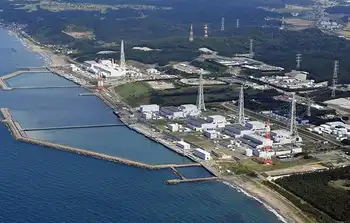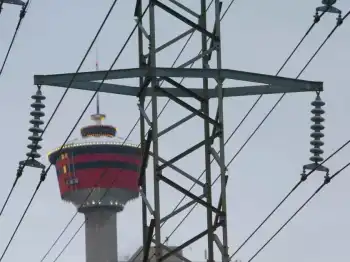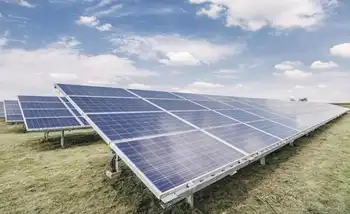China Will be world's biggest polluter by 2020
By Toronto Star
CSA Z463 Electrical Maintenance
Our customized live online or in‑person group training can be delivered to your staff at your location.

- Live Online
- 6 hours Instructor-led
- Group Training Available
For the Greenpeace activist, the daily smog is a red flag. Two years ago her environmental group set out to paint Red China green, but a booming economy is pushing pollution into the stratosphere.
"Normally you can't even see the buildings right in front of us," Yang grumbles, peering at the clogged roadways and high-rises sprouting around her.
Second only to the United States in emitting the greenhouse gases that cause global warming, China is destined to become the world's biggest polluter within 15 years. Demand for coal-fired power plants that belch carbon dioxide fumes into the air is soaring faster than environmentalists like Yang can catch their breath.
Seven of the world's 10 most polluted cities are in China, where filth invades your eyes and coal dust clogs your throat. Yet here in the southern province of Guangdong, which bills itself as factory to the world, conservation is a hard sell.
Yang is one of 40 Greenpeace staffers campaigning to raise environmental consciousness across China, where economic growth is surging by nearly 9 per cent a year. Unlike flamboyant Greenpeace activists elsewhere, she can't organize publicity stunts or call public protests lest the Communist government shutter her offices.
"In China we're just at the beginning stages of raising public awareness," the young activist says diplomatically.
If China has been slow to wake up to the fallout from its factories, the rest of the world is watching closely — and holding its breath. Foreign environmentalists always buttonhole Yang at conferences to demand that China be more accountable for its pollution, but she says such attitudes will backfire.
"It's important for Westerners to understand that there are no moral grounds to just say, `Stop developing!'" Yang explains. "If you wag your finger and tell us how to run our lives, China will shut down the conversation and that would be the worst thing."
Yet the spotlight will be on China next week when President Hu Jintao sits in on the Group of 8 summit of industrialized nations from July 6 to 8 in Gleneagles, Scotland. With its superheated economy slated to quadruple in size by 2020 — and emissions of greenhouse gases likely to keep pace — Hu will be under pressure to do more to combat global warming.
China has ratified the Kyoto Protocol, which commits most industrialized countries to reduce greenhouse gases by 2012. But as a developing country, it is exempt from any commitments to curb pollution at home.
Moreover, Beijing has signalled it is in no hurry to accept any fresh obligations when the second phase of the treaty is due to take effect in seven years. Indeed, China is hedging its bets, waiting and watching to see whether the industrialized nations do more first.
"This is a very delicate question," Environment Minister Xie Zhenua told reporters earlier this month. "We still have time until 2012."
To date, China has vigorously opposed any voluntary or obligatory reductions by developing states. Increasingly, Beijing's negotiating position is that too much emphasis is being placed on reducing climate change — and that the world must learn to live with it — an unsettling stance for environmentalists.
Environmental stewardship has never been a priority in Communist China, whose Maoist ideology viewed nature as a force to be harnessed in the war on poverty. The environment was merely a battlefield, with pollution treated as collateral damage or welcomed as a sign of industrialization.
Political scientist Paul G. Harris, who specializes in China's environmental diplomacy, says Beijing strenuously resists any foreign lectures about curbing pollution, citing the West's profligate waste and cumulative harm to the environment. Nor will Chinese pride countenance any hectoring that smacks of the humiliations of its colonial past.
"It will set things back because the Chinese will dig in their heels," says Harris, who teaches at Hong Kong's Lingnan University. "You know how strongly China feels about criticism from the West, so it's very important that the G-8 says we (the West) accept responsibility for this problem and we have to act first."
Yet Harris cautions that China's indifference and defiance could backfire in the future, eroding its claim to leadership of the developing world. Global warming will disproportionately harm low-lying, flood-prone Asian countries like Bangladesh, which will one day ask why Beijing failed to heed warnings.
Despite its demands for disproportionate action from the West, China won't be able claim it was unaware of the dangers of its own pollution, which "raises very interesting ethical issues," Harris observes.
With the embrace of capitalism and the quest for prosperity, the country has shifted from Communism to consumerism. Now, the middle classes and even the masses aspire to have energy-guzzling electrical appliances at home. Government statistics show that China manufactures roughly 25 million refrigerators a year and twice that many air conditioners — with most destined for the domestic market.
"After all these years, everyone wants to enjoy the good life — luxury is a good thing to them," says Feng Wang, a volunteer with the environmental group Global Village of Beijing, which is trying to curb overuse of air conditioners.
China's mentality of "developing first and preventing and controlling pollution later" has been blasted as "absolutely wrong" by the country's most vocal environmental official, Pan Yue.
As deputy director of the State Environmental Protection Administration (SEPA), he warned this month that "the pollution load of China will quadruple in 2020" unless attitudes change and the economic trajectory eases up.
"Now we can see this `workshop for the world' means that we, using our resources, produce low-level industrial products for developed countries and bear the harm of pollution," Pan argued in a speech.
SEPA made history last January by ordering 30 polluting major infrastructure projects, including 23 power stations, shut down because they had failed to secure environmental approvals. Yet by this month, all but one of the power stations had received the green light to resume construction, suggesting that SEPA lacks the clout to make other government departments go along — or even to enforce its will in the provinces where environment officials are beholden to their local political masters.
In prosperous Guangdong province, the local environment bureau is weighed down by an economy that grew by a staggering 14 per cent last year, placing extra strains on coal-fired power plants. Sulphur dioxide emissions jumped by 7 per cent and the number of vehicles on the road climbed by 12 per cent.
"Sometimes, under the pressure of economic growth, local leaders may not pay enough attention to this problem," vice-director Chen Guangrong says in an interview at his government office.
Guangdong is one of 10 provinces experimenting with the concept of "Green GDP" statistics so that the performance of bureaucrats will be judged on the overall impact of their policies rather than economic development at any cost. The program is in its infancy, but state media have reported that GDP would have been cut by 2 per cent if environmental costs had been considered.
"We're trying to deduct the environmental pollution loss from economic performance," says Chen.
Most funding for China's environmental programs comes from overseas donors, including more than $64 million from Canada since 2000, making it one of the biggest contributors.











